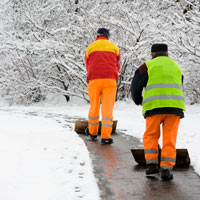Cold Weather Dangers for Workers
January 16, 2019 According to the Occupational Safety and Health Administration (OSHA), along with the colder temperatures the winter also brings with it some weather-specific hazards that impact workers. During the colder months, certain tasks – like working around damaged or downed electrical power lines, driving, and removing snow from rooftops – can be especially dangerous, which is why the rate of injury-causing slip and falls can increase. To avoid preventable winter workplace accidents, OSHA recommends that employers implement an array of different safety measures.
According to the Occupational Safety and Health Administration (OSHA), along with the colder temperatures the winter also brings with it some weather-specific hazards that impact workers. During the colder months, certain tasks – like working around damaged or downed electrical power lines, driving, and removing snow from rooftops – can be especially dangerous, which is why the rate of injury-causing slip and falls can increase. To avoid preventable winter workplace accidents, OSHA recommends that employers implement an array of different safety measures.
Winter Work Hazards
Throughout the winter season, OSHA reports that the following work-related duties are known to be the most hazardous for working men and women:
- Working at heights (the higher the height, the more dangerous it can be);
- Removing downed trees in severe weather conditions;
- Using powered equipment (e.g. snow blowers);
- Driving;
- Working in active work zones, particularly on highways, and:
- Shoveling snow
Work Zone Statistics
The Department of Transportation (DOT) reports that at least one highway worker is killed in a motor vehicle-related collision during the typical five-day workweek; the Centers for Disease Control and Prevention (CDC) estimate that there are more than 120 worker deaths related to work zone collisions every year. With colder weather come hazardous conditions – like sleet, ice, rain, and snow. According to the National Highway Traffic Safety Administration (NHTSA), 17% of all car crashes occur during winter months. There are numerous traffic control devices in place throughout active and inactive work zones – and they help keep workers and drivers alive.
Electrical Hazards
Working around and using powered equipment can also result in serious injuries – even death – for workers. When it comes to power tools like snow blowers, one of the most common causes behind lacerating and amputation injuries is when a person tries to clear jammed equipment while the power is still on. It is also critical to NEVER attempt to clear jammed equipment by hand. Some other known power tool-related hazards include:
- Ungrounded or improperly grounded equipment that can result in electrocution;
- Adding fuel to equipment while it is powered on or is still hot after being recently turned off, and:
- Unguarded or improperly guarded machinery, especially during service and/or maintenance
Slip and Falls
It should come as no surprise that in icy and snowy weather the chances for dangerous slip and falls also grow. Luckily, there are numerous effective control measures that employers and employees can take to limit the prevalence of these incidents. Workers need to ensure wearing proper footwear, like styles that are equipped with sufficient treading. Here are a few other examples of OSHA’s safety tips to prevent wintertime slips and falls:
- Take shorter steps and walk more slowly in order to react to traction changes, and:
- Keep a pair of rubber over-shoes to put over work shoes and/or boots readily available
Employers are Responsible for Maintaining Worker Health and Safety
Every employee is obligated to have effective – and federally compliant – worker safety and health programs in place. These programs protect workers from known and recognizable workplace hazards, which includes inclement winter weather. It is particularly essential that outdoor workers be shielded from cold weather-related hazards, but indoor workers are also at risk for weather-related injuries (e.g. falls from wet surfaces, etc.).
If you have questions or concerns about a work-related injury or want to find out how to file a workers’ compensation claim to help cover medical expenses from your injuries, please contact a representative at our firm directly.
Philadelphia Workers’ Compensation Lawyers at Galfand Berger, LLP Represent Individuals Injured at Work
If you were injured at work, please contact our Philadelphia Workers’ Compensation lawyers at Galfand Berger. With offices located in Philadelphia, Bethlehem, Lancaster, and Reading we serve clients throughout Pennsylvania and New Jersey. To schedule a consultation, call us at 800-222-8792 or complete our online contact form.
 Google Screened
Google Screened
